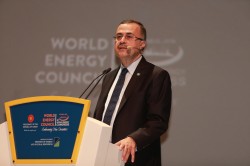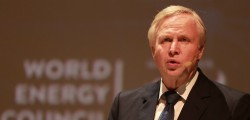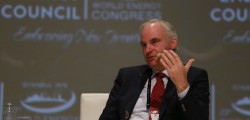The World Energy Council gave out a clear message at the World Energy Congress that took place this week in Istanbul: the world needs to move away from fossil fuels much faster than it is doing today. That contrasted sharply with the message given out by most of the high-level speakers from government and business at the Congress, who stressed that the world needs more oil and gas. Mohammad Barkindo, the new Secretary General of oil cartel OPEC even warned that oil should not be “discriminated” against. Energy Post’s editor in chief Karel Beckman reports on the clashing visions in Istanbul.
The World Energy Congress is not just any event. Taking place every three years, organised by the World Energy Council, it is one of the biggest energy conferences in the world, and one of the most “high-level” – if you regard energy ministers and CEO’s of multinationals as “high-level”.
This year, in the troubled city of Istanbul, for the first time even a number of presidents showed up – those of Turkey, Russia, Venezuela and Azerbaijan – though the attendance was disappointing with around 2,000 delegates, only a third of the number at the previous Congress in Seoul in 2013. Fear of terrorist attacks no doubt prompted many to stay away.
“The biggest obstacle in achieving the climate goal is the rapid and successful transitioning of global transport to low carbon solutions”
Whether the World Energy Council should be happy with the presidential attention it got in Istanbul is another matter. Vladimir Putin, Recep Tayyip Erdoğan, Ilham Aliyev and Nicolás Maduro are a questionable quartet not just from a human rights perspective, but from an energy perspective as well.
Three of them represent countries that depend heavily on income from fossil fuels. The fourth, Turkey, is positioning itself as a gas and oil transit hub – and last year announcedplans to double its coal power capacity from 34 GW in 2014 to 60 GW in 2019. Their presence at the Congress – and their messages – contrasted starkly with the message the World Energy Council was trying to bring out: the necessity of what it calls a “Grand Transition” away from fossil fuels.
Stranded assets
On the first day of the Congress, the World Energy Council gave out an official statement with a wake-up call to the fossil fuel sector, under the heading of “the New Realities for Energy”. It said, among other things:
“We haven’t done enough to decarbonise our economies: the world will have to accelerate the decarbonisation of the global GDP to a rate of 6%/yr in order to remain within the carbon budget associated with 2C global warming. This will take considerable effort since with current trends we could reach and surpass the carbon budget between 2045 and 2055, even with optimistic assumptions on energy intensity reductions. The Nationally Determined Contributions (NDCs) agreed at COP21 provide about 1/3rd of the required ambition level.”

World Energy Council pointedly added that the “biggest obstacle” in achieving the climate goal is “the rapid and successful transitioning of global transport to low carbon solutions.”
Christoph Frei, Secretary General of the World Energy Council, made the point even clearer in an interview that appeared in a newspaper distributed at the Congress. “If you look at how much we have in proven reserves globally”, he said, “this equates to about 2800 gigatonnes of carbon dioxide emissions. The carbon budget we have [to maintain global temperature rise to within two degrees Celsius] is 1,000 gigatonnes.”
Amin Nasser, CEO of Saudi Aramco, the world’s biggest oil producer, said his company would invest $300 billion over the next ten years in new oil and gas projects
This Grand Transition, said the World Energy Council statement, “will impact the economic foundation of both nation states and businesses” and “lead to a “rebalancing across regions and sectors: … The next decade will begin to define the winners and losers of the energy transformation”.
For some these messages might not seem very shocking, but their significance lies in where they come from.
The World Energy Council can lay claim to being the voice of the established global power sector. Founded in 1923, when Scotsman Daniel Dunlop organised the first World Power Conference in London, attended by 1700 delegates from 40 countries, it is now a UN-accredited body with almost 100 national member committees whose members are made up of representatives from business, government and academia.
Its “patrons” and “global partners” include companies such as EDF, Engie, GE Power, Korea Electric Power Company, Siemens, Tokyo Electric Power Company, Abengoa, Enel, DNV GL, Eon, National Grid and Repsol.
Thus, its statement on the “New Energy Realities” carries some weight. It was the first time, to my knowledge, that the World Energy Council explicitly and officially adopted the harsh language of “stranded assets” (also known as the Carbon Bubble).
Great plans
Yet this was not the language of the presidents and ministers nor of most of the captains of industry at the Congress, who came mainly from the oil and gas industry rather than – as one might expect – the power sector.
They spoke almost with one voice, about the need of course to expand renewable energy – Vladimir Putin even mentioned the importance of smart grids (!) – but above all about their great plans for new oil and gas projects. President Maduro referred to a great gas project in the north of Venezuela and invited “investors” to come to his country to boost its oil and gas production. Putin emphasized that Russia “will continue to invest in oil and gas development”.
The executives of the oil companies at the Congress spoke in similar terms. Amin Nasser, CEO of Saudi Aramco, the world’s biggest oil producer, said his company would invest $300 billion over the next ten years in new oil and gas projects. Bod Dudley, CEO of BP, said “We need to keep investing for future growth and that means making big choices to sanction big projects”. BP has recently made a number of large investments in gas projects: the Tangguh LNG plant in Indonesia, the Khazzan tight gas project in Oman and the Shah Deniz 2 project in Azerbaijan.
There was no hint that the oil and gas producers are worried about “stranded assets”. They did not express any intention to steer their investments away from fossil fuels nor did they seem to feel that the Paris Agreement will require them to do so. Mohammad Barkindo, the brand new Secretary General of oil cartel OPEC, even called on policymakers not to “discriminate” against oil. He said oil should be seen as a “fuel of choice” and added that “We should not use the Paris Agreement to discriminate against any energy source.”

How the world can reduce greenhouse gas emissions without “discriminating” against oil, he did not explain.
The oilmen all had a ready justification for their business-as-usual stance: the world will need more energy, they said, and this can only be delivered in the form of fossil fuels. They all made reference to the people in the world who have “no access to energy”. They based their view of the inevitability of fossil fuels on projections and scenarios from institutions like the International Energy Agency (IEA) and indeed the World Energy Council itself, which, it is true, state that most of the world’s energy needs will be met by fossil fuels for many decades into the future.
Amin Nasser of Saudi Aramco said, for example, that “the share of fossil fuels will still be 75% in 2040” and oil production would need to grow to 104 million barrels per day (from 90 million today) to meet demand. Dudley of BP said that “even if renewables were to grow faster than any fuel has done, they are unlikely to contribute more than 15% of the total energy mix by 2015”.
Energy 2.0
The view of our energy future that Nasser unfolded was typical. He said that “business as usual” is not an option – not because of the climate, but because “existing oil fields are depleting fast” and “it is increasingly difficult to find new oil”.
Hence, he said, we need “new roadmaps”, a “new business model that we will all need to embrace”, which he called “Energy 2.0.” This consists of three elements. First, he said, we must make continued investment in new oil and gas projects. Second, the oil industry needs to cut cost relentlessly. Third, it needs to invest in “cleaner oil”.
For the longer term (presumably that would be business model Energy 3.0), “technical progress” would lead to a greater share of renewable and alternative energies, said Nasser. But that is still a long way away.
“It is up to us , the oil industry, to determine the future of energy”
Nobody asked whether all this new investment in oil and gas would lead to more “stranded assets” in the future or what might happen if Saudi Aramco and the other oil producers would spend their hundreds of billions of dollars on other forms of energy than oil and gas.
To be sure, the oil companies are investing in alternatives. Dudley of BP, for example, referred to the company’s activities in wind power in the US and biofuels in Brazil, bragging that among oil companies BP was probably the biggest investor in renewables.
But a look at BP’s website shows that these investments are very small compared to their fossil fuel business. BP’s American wind power businesses encompasses all of 14 wind farms (2200 MW), enough to “power all the homes in a city the size of Philadelphia”. In Brazil, BP has invested some half a billion dollars in its biofuels business over a number of years. To compare: the company’s capital expenditure in 2015 alone was $20 billion.

Since oil company Total bought battery maker Saft in July for $1.1 billion and acquired 60% of solar power player SunPower in 2011 for $1.4 billion, Dudley’s claim that BP is the largest investor in renewable energy among oil companies seems doubtful. But the bigger point is that at present all oil companies are far from converting themselves into renewable energy companies.
Going after coal
The oil companies do have another narrative which they talked about in Istanbul and which is a bit more credible: they are changing from oil into natural gas companies. Gas of course is less CO2-intensive than oil. For example, Saudi Aramco’s investment of over $300 billion in the next decade will mostly go to gas, CEO Nasser said. BP is also putting most of its money into gas.
According to Fatih Birol, Executive Director of the IEA, “there are fossil fuels and fossil fuels. Coal and oil should be discouraged. Natural gas will continue to play an important role in even our most stringent climate scenarios.”
Maarten Wetselaar, Director Integrated Gas and New Energies for Shell, said that “we should go after coal first”. To replace coal, he said, will require a lot of gas and oil. Wetselaar also said he did not regard electric cars as a threat for the oil industry for a long time to come. The main challenge for the oil industry today, according to Wetselaar, is to cut costs.
“I don’t see mega-power companies emerging like the oil companies”
Asked whether they are worried about the impact new climate legislation will have on their business, in the wake of the Paris Agreement, none of the oil executives answered affirmatively. Patrick Pouyanné, CEO of Total, came closest by frankly admitting that “our industry is responsible for 40% of greenhouse gas emissons”, implying that the industry would need to change quite drastically.
Pouyanné made a telling remark in this context. He said it is “up to us [i.e. the oil industry] to determine the future of energy”. We have the money, the technological know-how and the people to do so, he said.
But that is exactly the zillion-dollar question, which the oil sector seems reluctant to face: is it up to them?
They still think it is. At the World Energy Congress it was clear that they can’t think of themselves as the losers in this race – but maybe that’s because the real winners that will determine our energy future were not present in Istanbul. They may be altogether different people.
Mega-power companies
The World Energy Congress did provide other perspectives from that of the oil industry. At one plenary debate about “Innovative business models” the tone was very different. Here the panellists – which included Johannes Teyssen, CEO of Eon,

Jean-Bernard Lévy, CEO of EDF and Michael Bell, CEO of US-based tech company Silver Spring Networks – seemed to be speaking an altogether different language. The new energy economy “is all about sharing”, said Teyssen. “Open platforms. Forget control.”
Christoph Frei, the World Energy Council’s Secretary-General, said in an interview for the Congress daily paper that “by 2060 electricity is going to be the new oil”.
According to Teyssen, this future world, dominated by electricity, will look very different from the world of today, dominated by oil producing states and multinational oil companies. “I don’t see mega-power companies emerging like the oil companies”, he said. But then he was not on the same panel with his colleagues from the oil and gas industry.








